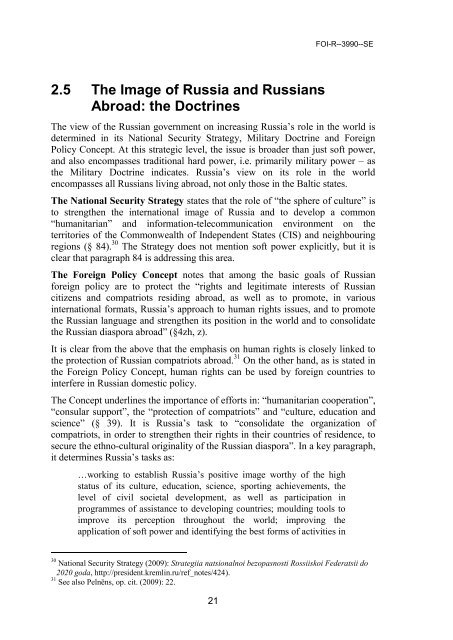FOI-R--3990--SE_reducerad
FOI-R--3990--SE_reducerad
FOI-R--3990--SE_reducerad
You also want an ePaper? Increase the reach of your titles
YUMPU automatically turns print PDFs into web optimized ePapers that Google loves.
<strong>FOI</strong>-R--<strong>3990</strong>--<strong>SE</strong><br />
2.5 The Image of Russia and Russians<br />
Abroad: the Doctrines<br />
The view of the Russian government on increasing Russia’s role in the world is<br />
determined in its National Security Strategy, Military Doctrine and Foreign<br />
Policy Concept. At this strategic level, the issue is broader than just soft power,<br />
and also encompasses traditional hard power, i.e. primarily military power – as<br />
the Military Doctrine indicates. Russia’s view on its role in the world<br />
encompasses all Russians living abroad, not only those in the Baltic states.<br />
The National Security Strategy states that the role of “the sphere of culture” is<br />
to strengthen the international image of Russia and to develop a common<br />
“humanitarian” and information-telecommunication environment on the<br />
territories of the Commonwealth of Independent States (CIS) and neighbouring<br />
regions (§ 84). 30 The Strategy does not mention soft power explicitly, but it is<br />
clear that paragraph 84 is addressing this area.<br />
The Foreign Policy Concept notes that among the basic goals of Russian<br />
foreign policy are to protect the “rights and legitimate interests of Russian<br />
citizens and compatriots residing abroad, as well as to promote, in various<br />
international formats, Russia’s approach to human rights issues, and to promote<br />
the Russian language and strengthen its position in the world and to consolidate<br />
the Russian diaspora abroad” (§4zh, z).<br />
It is clear from the above that the emphasis on human rights is closely linked to<br />
the protection of Russian compatriots abroad. 31 On the other hand, as is stated in<br />
the Foreign Policy Concept, human rights can be used by foreign countries to<br />
interfere in Russian domestic policy.<br />
The Concept underlines the importance of efforts in: “humanitarian cooperation”,<br />
“consular support”, the “protection of compatriots” and “culture, education and<br />
science” (§ 39). It is Russia’s task to “consolidate the organization of<br />
compatriots, in order to strengthen their rights in their countries of residence, to<br />
secure the ethno-cultural originality of the Russian diaspora”. In a key paragraph,<br />
it determines Russia’s tasks as:<br />
…working to establish Russia’s positive image worthy of the high<br />
status of its culture, education, science, sporting achievements, the<br />
level of civil societal development, as well as participation in<br />
programmes of assistance to developing countries; moulding tools to<br />
improve its perception throughout the world; improving the<br />
application of soft power and identifying the best forms of activities in<br />
30 National Security Strategy (2009): Strategiia natsionalnoi bezopasnosti Rossiiskoi Federatsii do<br />
2020 goda, http://president.kremlin.ru/ref_notes/424).<br />
31 See also Pelnēns, op. cit. (2009): 22.<br />
21


